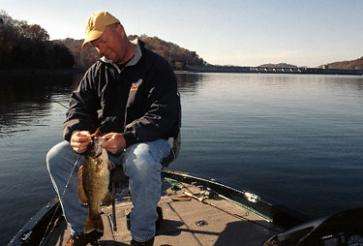
I’m back home. The weather has been real tough around most of the country. I mentioned that a couple of weeks ago, and it’s gotten worse. It’s really messed up the smallmouth fishing.
The guys I’ve been talking to lately are having one good day and then having a bad day. It seems like nobody can put a consistent pattern together. I think it’s the weather and the water temperature that’s causing all the problems.
We’ve had all kinds of snow this winter. In most parts of the country, it’s melting just before another snowstorm hits. That makes for huge amounts of cold water entering the rivers and lakes.
Here in Tennessee, the water’s between 39 and 41 degrees, with some places even colder than that. You have to remember that fish are cold-blooded. That means their bodies are 40 degrees or so. They don’t — can’t — move very fast, and they don’t eat much.
That makes for hit-and-miss fishing. One day you’re on the water at just the right time, and you catch a dozen. Another day you miss it by an hour, and you blank. That’s the reports I’ve been getting, anyway. A really good guide who works down here went out Monday and caught one.
On Tuesday he had 14 with one of them around 5 pounds. He was fishing the float-and-fly, and he knows how to do it right. His observation was that the slower you can stand to fish, the better. Usually we let our fly sit still for about 10 seconds before we wiggle it a little bit. But this week he’s been letting his sit still for between 30 seconds and a minute.
Even a minute didn’t help him on Monday. They just wouldn’t bite. I’d say that if you’re going to try it, you should fish as slow as possible no matter what lure you use. That might sound like ordinary advice because everyone tells you to fish slow when it’s cold, but it’s still worth remembering.
The other thing you should do is go at different times of the day. That way you can at least try to figure out when they’re biting and then go fishing at that time until it changes. I know this doesn’t sound real upbeat or positive, but that’s the way it is. Once the weather around the country breaks, everybody’ll be able to get to the ramps and the water should warm up a little bit.
That’ll probably mean the fishing will catch fire, and we’ll all think we’re real smart because we can catch them. While you’re thinking about all this, you might want to consider that we could have a late spring. Even if it warms up in early March, the water will be so cold that the fishing will be running behind schedule.
That means you’ll have to fish behind schedule if you want to catch them.
Until next time, if you have any questions or comments, I’d love to hear from you. Please e-mail me atStephen@thesmallmouthguru.com.





